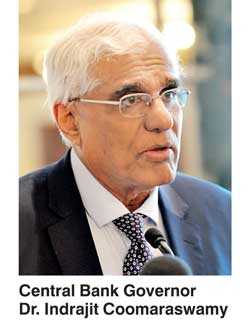Monday Mar 02, 2026
Monday Mar 02, 2026
Tuesday, 4 September 2018 00:33 - - {{hitsCtrl.values.hits}}
By Charumini de Silva
In the backdrop of the Finance Ministry preparing its Budget for 2019, Central Bank Governor Dr. Indrajit Coomaraswamy has called for strong deficit control, as any fiscal slippage could make it more challenging for Sri Lanka to meet an estimated $15 billion in debt repayments starting next year. 
The Government is expected to announce Presidential Elections in the second half of 2019, and economists have voiced concern over the possibility of populist measures being included in the next Budget, driving up State expenditure, widening the Budget deficit, and derailing fiscal consolidation crucial to maintain sovereign ratings. Dr. Coomaraswamy acknowledged Sri Lanka would have to work within a very tight framework in the next few years, but was confident of successfully managing debt repayments.
“The bottom line as far as debt management is concerned – at the moment it is still manageable. It is very challenging, but it is manageable,” Dr. Coomaraswamy said, addressing the Postgraduate Institute of Management Alumni Association (PIMA) CEO Forum, titled ‘The Development Landscape of Sri Lanka in 2025’.
However, the Governor cautioned that if the Government lost control of its Budget, then there would be very serious and severe consequences.
According to Dr. Coomaraswamy, Sri Lanka requires $ 4 billion per year to meet external liabilities that are likely to run till 2022, as well as the Government’s future requirements. Therefore, he emphasised on the need for the Government to control its Budget. “We are on the edge. Our debt to GDP ratio is at 77%, our rating peers in medium term are 45% to 50%. Over time we have to reduce it, but it will take some time.”
He highlighted the need to build confidence in the economy to reassure international capital markets, from which the Government would have to borrow money to fund debt repayments. “When you mismanage your economy, you lose your economic sovereignty. If you lose your sovereignty to the IMF, rating agencies and international capital markets, you end up in a severe crisis,” he stressed.
The Governor said Sri Lanka had relatively little room left, having not managed the country’s economy properly for decades. “We have now in many senses handed away our economic sovereignty and there is a pretty tight framework within which we have to operate under whatever government. If you don’t want the economy to collapse, then you have to work on a fairly tight framework,” he emphasised.
He said the Liability Management Act which came into place from April had created flexibility for the economy to build some buffers. “The Liability Management Act comes with very tight supervision. You need to get Cabinet and Parliament approval. This framework helps us to address the bunching effects starting from next year. However, to do all these we need to maintain our ratings and access to international capital markets,” he added.
Sri Lanka’s rating balances an improving policy framework, which supports macroeconomic stability and rising government revenues, against a challenging external debt servicing outlook and high government debt, Fitch Ratings said yesterday.
The rating is supported by higher per-capita income levels and stronger governance standards than the ‘B’ category median, the ratings agency said in their latest Sovereign Credit Overview for Asia Pacific countries.
“The International Monetary Fund (IMF) completed its fourth review under a three year extended fund facility in place since June 2016. Progress has been made on critical fiscal reforms, including approval of an automatic fuel price mechanism effective May 2018,” it said.
Fitch also observed authorities have also taken steps to introduce an automatic electricity pricing mechanism and establish a committee to develop a detailed restructuring plan for Sri Lankan Airlines. “Nevertheless, Sri Lanka’s government debt remains high at around 77% of GDP, far above the ‘B’ median of 66.6%. The sovereign’s projected debt service payments are significant, at $15 billion in 2019-2022, from a bunching of sovereign bond redemptions, while its foreign-exchange reserves stood at only $9.3 billion at end-June. The scale of external refinancing over the next few years creates a potential vulnerability for the sovereign particularly as US interest rates are on the rise.”
Fitch also pointed out political uncertainty increased following the ruling coalition’s heavy losses during the local elections in February, followed by a vote of No Confidence against the Prime Minister in April and temporary suspension of Parliament in May. “The risk of political uncertainty disrupting policy continuity, however, is mitigated by the election schedule, in which Presidential Elections are not due until end-2019, with Parliamentary elections to follow.”
Further improvement in external finances supported by higher non-debt-creating inflows or a reduction in external sovereign refinancing risks from improved liability management. Continued improvement in public finances underpinned by a credible medium-term fiscal strategy would improve Sri Lanka’s economic prognosis.
Reversal of fiscal improvements that leads to a failure to stabilise government debt ratios, deterioration in policy coherence and credibility, leading to loss of investor confidence, or a derailment of the IMF-supported program that leads to external funding stress would be a credit negative for Sri Lanka, the report noted.